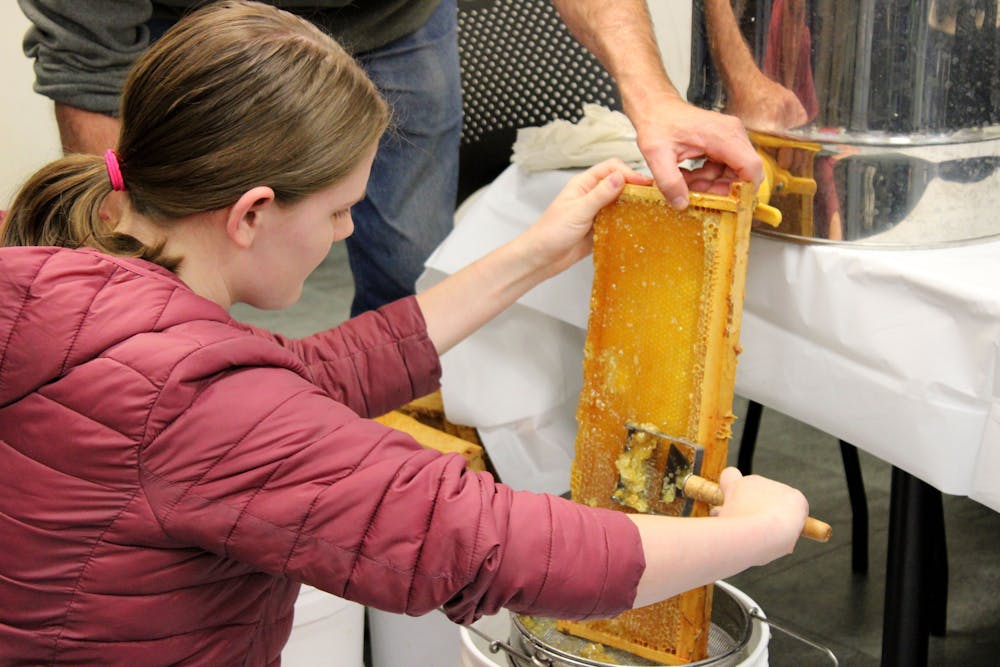Hidden away on the second floor of MGC, American University’s bee hives aren’t a well-known feature of campus. But Perry Heredia, a junior in the School of International Service and the president of the Beekeeping Society at AU, is hoping to change that.
Heredia visits the apiary — the garden where the bees are kept — every few weeks with other students and advisors to inspect the hives. Beyond simply spending time at the hives, she says she has made spreading the word about beekeeping at AU a priority for her time as president.
The club hosts frequent events and partners with AU’s Community Garden and the DC Beekeepers Alliance, with the goal of promoting sustainability on and off campus.
“When I became president, I really wanted to expand Beekeeping’s outreach to be a place for sustainability and environmentalism on campus but also off campus and really do a lot of outreach with the DMV community,” Heredia said. “Just because we’re so privileged to be here and have so many cool resources, so I really wanted to share that.”
Part of this outreach includes encouraging students to take advantage of the DC Beekeepers Alliance’s spring beekeeping course and mentorship opportunities. The course, free for AU students, trains in hive maintenance and allows students to register as certified beekeepers in the District.
“It’s a 12-week course. It’s completely free to AU students, and you register through us,” Heredia said. “You get hands-on experience. You can also get mentee sort of experiences with different beekeepers in the DMV. It’s like my favorite thing ever. The people are so amazing.”
The course teaches beekeeping basics ranging from hive care to bee anatomy. Vice President Naomi Listokin, a junior in the School of Communication who took the course her freshman year, said the course was the first opportunity she’d had to really explore beekeeping.
“We learned all about bees and infections that they get, how to care for them, lifespan, everything. It was very, very interesting,” she said. “And then they offered a build day … [where] they taught us how to build frames and boxes for the hives and that was very cool.”
Back on campus, the Beekeeping Society at AU works with the Community Garden to host events and promote environmentalism. With the Garden set to be cleared for construction next year, Heredia said the groups have been working to find a space that works for both of their needs. Members from the Community Garden also help upkeep the flowers at the apiary.
But the club’s partnerships aren’t limited to just the Community Garden. Last May, the group partnered with over a dozen other student organizations to host the Bee Ball, an end-of-semester celebration with sustainable crafts and other activities.
“Bees are so crucial to our lives in general, like a lot of our food, plants, like a lot of ecosystems, have very different needs,” said Kendall Thayakaran, the club’s inclusivity chair and a junior in School of Public Affairs. “We had Bee Ball last year to kind of provide a bigger sense of awareness in the community. Because we not only do beekeeping but there's also just like larger responsibilities to the environment and promoting that.”
The club hosts a number of events on its own, including a semesterly honey extraction from the campus hives. Students can participate in each step of the process and even submit labels to be considered for the honey jars. The club then sells some jars to the Davenport Coffee Lounge and auctions off others at events throughout the year.
The club collects its own revenue from honey sales and larger events like the Bee Ball. The revenue helps cover the cost of hive maintenance, but the club donates the remaining funds to the DC Beekeepers Alliance.
Still, the common thread in each of the group’s events and partnerships is the goal to build a supportive community around environmentalism and sustainability.
Listikin says they’ve worked hard to create a “safe and open space” for anyone to come and feel supported no matter how involved they are in the group.
“I've never once felt like I have to drop this, like ‘I can't — this isn’t good for me,’” she said. “This is something I truly, truly do love doing, and everyone is just so understanding, and it really does bring me a lot of joy to see people show up to our events.”
Even with the community they’ve built, Heredia said the group is always looking to expand and reach new people on campus.
“We’ve done a couple just getting advocacy out for beekeeping,” Heredia said. “A lot of people don’t know that there are hives on campus, nor do they know that there’s a community garden on campus, so I think one of our main projects has just been to create awareness and kind of spread the word.”
This article was edited by Maeve Fishel, Jordan Young and Abigail Pritchard. Copy editing done by Isabelle Kravis and Luna Jinks.





